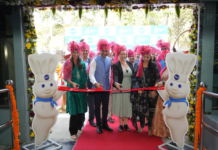
Gurugram-based Prasuma has pioneered the fresh and chilled delicatessen meat segment since 1985 in India. Lisa Suwal, chief executive officer of Prasuma, inherited the business from a family in delicatessen business for over 30 years. Prasuma claims of having over 250 stock-keeping units (SKUs), including bacon, sausages, cold cuts and gourmet meat in modern retail outlets across India. With a current product portfolio including smoked chicken jams, bacon-flavored jam, and other ready-to-eat products, Suwal is also looking forward to launching new meat products.

Exposed to the nitty-gritty of the business and the art of making good food products, she says, “In India, there are customers who know the value and importance of quality and safety parameters when it comes to meat. At Prasuma, we are committed to providing you with the highest quality delicatessen products. We use only the finest ingredients sourced from around the globe. Our commitment to quality and safety has made Prasuma the deli brand that people have been trusting for 30 years.” The premium deli meats offered by the company do not contain gluten, artificial colors or flavors and added monosodium glutamate (MSG).
Meat production in India is largely an unorganized activity. The presence of unregulated meat markets, tropical climate, inadequate hygiene measures and the absence of surveillance of slaughterhouses enhances the risk of meat-borne diseases. Spokespersons for the Ethical Treatment of Animals (PETA) claim that India has more than 30,000 unregistered slaughterhouses, which is considerably higher than the number of registered slaughterhouses. Moreover, many of these slaughterhouses lack in basic amenities such as light, ventilation and water. Consumers tend to buy meat from local meat and butcher shops that they trust. However, butcher shops are often exposed to dust and pathogenic bacteria, which leads to contamination and potential health hazards.
Table Growth rate of meat-producing animal and poultry in India
| Sl. No. | Species | Livestock Census 2003
(no. in million) |
Livestock Census 2007
(no. in million) |
Livestock Census 2012
(no. in million) |
Growth Rate (%) 2007-12 |
| 1 | Cattle | 185.2 | 199.1 | 190.9 | -4.10 |
| 2 | Buffalo | 97.9 | 105.3 | 108.7 | 3.19 |
| 3 | Sheep | 61.5 | 71.6 | 65.07 | -9.07 |
| 4 | Goat | 124.4 | 140.5 | 135.2 | -3.82 |
| 5 | Pigs | 13.5 | 11.1 | 10.3 | -7.54 |
| 6 | Poultry | 489 | 648.8 | 729.2 | 12.39 |
Source: Int.J.Curr.Microbiol.App.Sci (2018) Special Issue-7: 4627-4634
Quality is Prasuma’s brand pillars
According to Suwal, Prasuma acknowledges that quality is the utmost criteria for consumers today and she claims that the company promises to deliver the highest quality food from the farm to the consumer’s table. Adding more on quality practices and safety measures performed at Prasuma, she says, “Our production unit complies with all the best practices and product quality and food safety regulations. In addition to this, we are HACCP and ISO 22000:2005 certified, which ensures that we also meet international food safety and quality standards. We do not compromise food safety. Our products undergo several inspections and quality checks to meet customers’ expectations and for providing them with safe and quality products.” According to Suwal, the company believes in the natural growth of the animals and they do not give any drug or medication to accelerate any animal’s growth. She claims, “Our products are hormone and residue-free.”
Prasuma believes in sustainable packaging of meat
Increasing consumer demand and preferences for sustainable products are reshaping the food, beverage and restaurant industries and along with them the food packaging industry. As of today, consumers all across the world take recyclability, sustainability and biodegradability of packaging into account while buying products. A survey states that consumers believe that it is important for retail packaging to be recyclable and reusable.
Packaging plays a crucial role in protecting meat to remain fresh and retain its flavor over longer periods. It tries to limit the external factors such as temperature or hygiene in the end product quality for the time taken to reach the end consumer. Prasuma claims that it provides a longer shelf life while leaving the flavor and freshness of the meat unscathed. While sharing details about the type of packaging used at Prasuma, Suwal says, “Our products are vacuum skin packaged using barrier films. Our packaging is recyclable and environmentally friendly which also helps us to cut our business’ carbon footprint.” According to her, chilled vacuum-packed meat is one of the safest and most convenient ways for a meat processing plant to supply to both the foodservice and retail sector.
Prasuma proudly states that its distribution system differentiates it from other competitors in the market, where they ensure delivery of fresh products quickly and safely at the right temperatures with its own cold storage units in Gurgaon, Mumbai and Bengaluru. The products are available in supermarkets and gourmet stores throughout India.
IndiFoodBev — authentic, impactful and influential
An English-language food and beverage processing and packaging industry B2B platform in print and web, IndiFoodBev is in its third year of publication. It is said that the Indian food and beverage industries represent approximately US$ 900 billion in revenues which implies more than 20% of the country’s GDP. Eliminating the wastage on the farmside can help to deliver more protein to a higher number of the population apart from generating sizable exports. The savings in soil, seeds, water, fertilizer, energy and ultimately food and nutrition could be the most immense contribution that country is poised to make to the moderation of climate change.
To improve your marketing and grow sales to the food and beverage processing and packaging industry, talk to us. Our research and consulting company IppStar [www.ippstar.org] can assess your potential and addressable markets in light of the competition. We can discuss marketing, communication, and sales strategies for market entry and growth.
Suppliers and service providers with a strategy and budget for targeted marketing can discuss using our hybrid print, web, video, and social media channels to create brand recognition linked to market relevance. Our technical writers are ready to meet you and your customers for content.
The second largest producer of fruit and vegetables in the world is continuously expanding processing capacities and delivery systems with appropriate innovative technologies. We cover product and consumer trends, nutrition, processing, research, equipment and packaging from farm to thali. Get our 2025 media kit and recalibrate your role in this dynamic market. Enhance your visibility and relevance to existing markets and turn potential customers into conversations. Ask for a sample copy of our bi-monthly in print or our weekly IndiFoodBev eZine each Wednesday.
For editorial info@ippgroup.in — for advertisement ads1@ippgroup.in and for subscriptions subscription@ippgroup.in
Naresh Khanna – 10 February 2025
Subscribe Now










